|
Al-Azhar is the world's
oldest university, older than Cambridge or Oxford. Situated at the heart
of Cairo, Egypt's capital, Al-Azhar has been the greatest learning
centre for Muslims since it was first built by the Fatimid dynasty in
the 10th century AD.
The Fatimids were of
Shiah belief. They erected Al-Azhar as an institution to propagate the
teachings of the Isma'iliya madhhab. When the Ayyubids took over Egypt,
they turned Al-Azhar into a school that taught the Sunni understanding
of Islam.
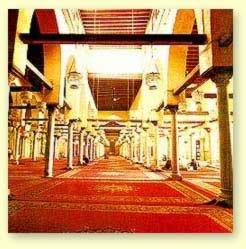 Rich
in tradition and knowledge, Al-Azhar had produced brilliant ulama
throughout history. Examples of Imam Suyuti, Imam Ibn Hajar 'Asqalani
and Imam Ibn Hajar Al-Haitami bejeweled its glorious past. Contemporary
ulama produced by this university include Shaykh Ghazali and Shaykh
Sha`rawi. With thousands of others, these giants of Islamic knowledge
became the symbol of Al-Azhar supreme position among Muslims, something
unrivalled thus far. Rich
in tradition and knowledge, Al-Azhar had produced brilliant ulama
throughout history. Examples of Imam Suyuti, Imam Ibn Hajar 'Asqalani
and Imam Ibn Hajar Al-Haitami bejeweled its glorious past. Contemporary
ulama produced by this university include Shaykh Ghazali and Shaykh
Sha`rawi. With thousands of others, these giants of Islamic knowledge
became the symbol of Al-Azhar supreme position among Muslims, something
unrivalled thus far.
Today, Al-Azhar is not
just a university, but an institution that vanguard the teachings of
Sunni Islam, and an umbrella body to which thousands of ulama affiliate
themselves with. The Head of Al-Azhar, called the Grand Imam (Imamul
Akbar Shaykhul Azhar), was previously appointed by a committee of
Azharian top scholars (shuyukh). But now it is under the appointment
from the Egyptian President from the advice of the committee. Recently
however, the Egyptian government is getting inclined to leave the matter
of appointment purely in the hands of the Azharian ulama.
The
Shuyukh of Al-Azhar (The Grand Imams)
|
![[]](http://www.sunnah.org/history/Scholars/shuyukh.gif)
1.
[ ???? - 1690 ] Shaykh Muhammad al-Kharashi
2. [ 1690 - 1694 ] Shaykh
Ibrahim al-Baramawi
3. [ 1694 - 1708 ] Shaykh
Muhammad al-Nasharti
4. [ 1708 - 1711 ] Shaykh Abd
al-Baqi al-Qillini
5. [ 1711 - 1720 ] Shaykh
Muhammad Shannan
6. [ 1720 - 1724 ] Shaykh
Ibrahim al-Fayyumi
7. [ 1724 - 1757 ] Shaykh
Abd-Allah al-Shabrawi
8. [ 1757 - 1767 ] Shaykh
Muhammad al-Hifni
9. [ 1767 - 1768 ] Shaykh Abd
al-Ra'uf al-Sijjini
10. [ 1768 - 1776 ] Shaykh
Ahmad al-Damanhuri
11. [ 1778 - 1793 ] Shaykh
Ahmad al-Arousi
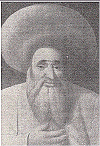
12. [ 1793 - 1812 ] Shaykh Abd-Allah al-Sharqawi
13. [ 1812 - 1818 ] Shaykh
Muhammad al-Shanawani
14. [ 1818 - 1829 ] Shaykh
Muhammad al-Arousi
15. [ 1829 - 1830 ] Shaykh
Ahmad al-Damhugi
16. [ 1830 - 1834 ] Shaykh
Hassan al-Attar
17. [ 1834 - 1838 ] Shaykh
Hassan al-Quwaisni
18. [ 1838 - 1847 ] Shaykh
Ahmad Abd al-Jawwad
19. [ 1847 - 1860 ] Shaykh
Ibrahim al-Bayguri
20. [ 1864 - 1870 ] Shaykh
Mustafa al-Arousi
21. [ 1870 - 1882 ] Shaykh
Muhammad al-Abbasi
22. [ 1882 - 1882 ] Shaykh
Muhammad al-Inbabi
23. [ 1882 - 1886 ] Shaykh
Muhammad al-Abbasi
24. [ 1886 - 1895 ] Shaykh
Muhammad al-Inbabi
25. [ 1896 - 1900 ] Shaykh
Hassouna al-Nawawi
26. [ 1900 - 1900 ] Shaykh Abd
al-Rahman al-Nawawi
27. [ 1900 - 1904 ] Shaykh
Selim al-Bishri
28. [ 1904 - 1905 ] Shaykh Ali
al-Biblawi
29. [ 1905 - 1909 ] Shaykh Abd
al-Rahman al-Shirbini |
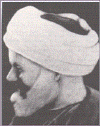
30. [ 1909 - 1909 ] Shaykh Hassouna al-Nawawi
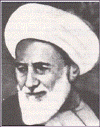
31. [ 1909 - 1916 ] Shaykh Selim al-Bishri
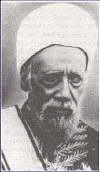
32. [ 1916 - 1927 ] Shaykh Muhammad Abu al-Fadl
al-Gizawi
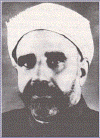
33. [ 1928 - 1929 ] Shaykh Muhammad Mustafa
al-Maraghi
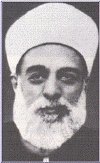
34. [ 1929 - 1935 ] Shaykh Muhammad al-Ahmadi
al-Zawahri
35. [ 1935 - 1945 ] Shaykh
Muhammad Mustafa al-Maraghi
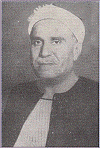
36. [ 1945 - 1947 ] Shaykh Mustafa Abd al-Raziq
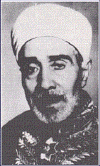
37. [ 1948 - 1950 ] Shaykh Muhammad Ma'moon al-Shinnawi
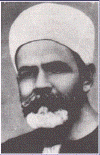
38. [ 1950 - 1951 ] Shaykh Abd al-Majid Selim
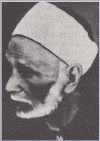
39. [ 1951 - 1952 ] Shaykh
Ibrahim Hamrush
40. [ 1952 - 1952 ] Shaykh Abd
al-Majid Selim
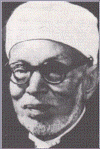
41. [ 1952 - 1954 ] Shaykh Muhammad al-Khidr
Husayn
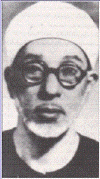
42. [ 1954 - 1958 ] Shaykh Abd
al-Rahman Taj
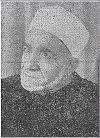
43. [ 1958 - 1963 ] Shaykh Mahmud Shaltut
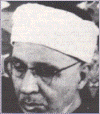
44. [ 1963 - 1969 ] Shaykh
Hassan Ma'moon
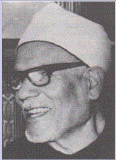
45.
[ 1969 - 1973 ] Shaykh Muhammad Muhammad
al-Fahham
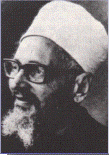
46.
[ 1973 - 1978 ] Shaykh Abd al-Halim Mahmud
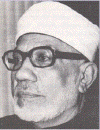
47. [ 1979 - 1982 ] Shaykh Muhammad Abd al-Rahman
Bisar
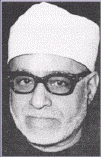
48.
[ 1982 - 1996 ] Shaykh Jadul-Haqq Ali Jadul-Haqq
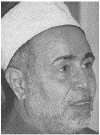
49. [ 1996 - Currently ] Shaykh Muhammad Sayid
Tantawi |
Shaykh Muhammad al-Kharashi
The first shaykh to
become the grand-imam of al-Azhar. Before his appointment, Al-Azhar
never had an organizational supreme at its top. The organization of the
institution was left to the Sultans and the princes. With the increase
in the number of students attending the institution, it was inevitable
to have a superior at the top level of the institution to organize its
activities.
Shaykh al-Kharashi was
born in the village of Abu-Khirash (Buhayra Province) in 1601 [1010 H].
He studied in al-Azhar the knowledges of Arabic language, Qur'anic
interpretation (tafsir), prophetic traditions (hadith) , Islamic
jursprudence (fiqh) following the Malikite school and logic (mantiq).
One of his well-known
students was Shaykh Ibrahim al-Fayumi who later became al-Azhar's
grand-imam. Shaykh al-Kharashi passed away in 1690 [1101 H] leaving a
multitude of publications which include:
- al-Sharh al-Kabir
li-Mukhtasar Khalil (jurisprudence)
- al-Fara`id
al-Saniya fi Hall Alfazh al-Sunusiya (theology)
- Muntaha al-Raghba
fi Sharh al-Nukhba
Shaykh
Muhammad al-Khidr Husayn( 1876 - 1958 )
Shaykh Muhammad al-Khidr
Husayn is the sole Grand Imam of a non-Egyptian origin to assume the
Grand Imamate of al-Azhar. He was born in Nfta, Tunisia to a family that
fled from Algeria in the face of the French invasion. Shaykh al-Khidr's
family was known for its devotion to religious knowledge. His uncle to
his mother was Shaykh Muhammad al-Makki bin `Azzouz, who was a reverred
scholar both in Tunisia and in Turkey. In southern Tunisian town of
Nafta, Shaykh al-Khidr memorized the holy al-Qur'an and started his
basic education.
In 1888 Shaykh al-Khidr
moved with his family to Tunis (Tunisia's capital). Two years later he
joined Jami' al-Zaytuna (The equivalent for al-Azhar in Tunisia). In
al-Zaytuna, Shaykh al-Khidr excelled in his studies, especially in
Arabic literature. He was offered a job in Tunisia's French controlled
government when he was still an undergraduate, but Shaykh al-Khidr
declined the offer. In al-Zaytuna, Shaykh al-Khidr had a strong
anti-colonial sentiment.
In 1903, Shaykh al-Khidr
graduated from al-Zaytuna. In the same year he founded a bi-monthly
magazine known as "al-Sa'ada al-`Uzma" (The Greater Happiness).
Although, the magazine attracted many of the famous Tunisian writers of
the time, it showed the great literative talent of Shaykh al-Khidr.
In 1905, Shaykh al-Khidr
became the grand judge of the Tunisian town of Binzert. In 1906, he gave
a lecture about liberty in Islam. Its main theme challenged the colonial
authorities in Tunisia. Soon his growing anti-colonial sentiment led to
his resignation from his judiciary position. In 1909, Shaykh al-Khidr
became a faculty member of al-Zaytuna.
In 1911, when Italy
declared war on Libya, Shaykh al-Khidr flared his magazine "al-Sa'ada
al-`Uzma" with anti-colonialism articles and called upon Tunisians to
volunteer in the war aside their Libyan brethern. Shaykh al-Khidr's
articles put him at odds with the French colonials in Tunisia. He was
accused by the French ruling authority by instigating the Tunisian
masses against the west. He eluded the trial by leaving Tunisia briefly
to Istanbul. Upon his return, he found that Tunisia was totally
controlled by its French rulers and he could not address the masses
through his magazine. Finally he decided to leave Tunisia and immigrate
to Syria.
On his way to Syria, Shaykh
al-Khidr stopped in Egypt and met with a number of Islamic scholars who
were the pioneers of the leading Muslim scholars of the time like
Shaykhs, Muhammad Rasheed Rida , Ahmad Taymur Pasha and
Muhib al-Din al-Khatib . After his settlement in Damascus he taught
Arabic language in the Sultaniya school.
In 1914, he left Damascus
for Istanbul to work in the Ottoman ministry of war, and in 1915 the
Ottoman wat minister, Anwar Pasha, sent him to Berlin where he
instigated the Tunisian-French POWs to against the French rule in
Tunisia. He then returned to Istanbul and then to his home in Damascus.
In 1916, the Turkish ruler
of Syria detained him in prison for a few months, but was freed upon the
orders of Anwar Pasha. In 1917 he travelled to Berlin for the second
time, where he met with many of the exiled Muslim Shaykhs like Shaykh
Abd al-Aziz Jawish and Dr. Abd al-Hamid al-Sa'id.
In 1918, the Ottoman empire
was declining to its final phase. The Turks lost Syria in the First
World War, and an Arab ruler was to be appointed, but the French forces
which landed in Syria during the war controlled the country. Shaykh
al-Khidr's previous anti-French activities put his life in danger, so he
immigrated to Egypt in 1921.
In 1922, he enrolled in
al-Azhar's final year, and obtained its `Alamiya certificate. He
then became one of the scholars of al-Azhar.
In Egypt, he established an
organization for helping freedom movements against French colonials in
Tunisia, Algeria and Morocco. Members of the organization included well
known freedom fighter who were in exile in Egypt like al-Habib Bourquiba
from Tunisia, al-Bashir al-Ibrahimi from Algeria and al-Fudayl
al-Warthilani from Morocco.
In 1925, Shaykh al-Khidr
became involved in one of the greatest ideological battles of the time.
An Azharite Shaykh (Shaykh Ali Abd al-Raziq) issued a book giving an
Islamic umbrella to secularism. Although Shaykh al-Khidr was a friend of
Shaykh Abd al-Raziq's family, he wrote a reply book where he elegantly
rebutted the secular implications. In the consequent year, the famous
Egyptian writer Taha Husayn issued another book about pre-Islamic Arabic
poetry which contained implicit attacks on Islam. Again, Shaykh al-Khidr
issued another book rebutting Taha Husayn's claims.
In 1927, Shaykh al-Khidr
collaborated with his Egyptian friend Ahmad Taymur Pasha in the
establishment of a Muslim youth organization known as "Jam'iyat
al-Shubban al-Muslimeen" (Association of Muslim Youth). Later he
established another organization for spreading the righteous
understanding of Islam. The later organization was known as "Jam'iyat
al-Hidaya al-Islamiya" (Association of Islamic Guidance).
In 1932, Shaykh Muhammad
al-Khidr Husayn obtained the Egyptian nationality.
In 1930, al-Azhar issued
its monthly magazine which was known in those times by the name "Nur
al-Islam" (The light of Islam), and Shaykh al-Khidr was appointed as its
chairman. In 1932, the general assembly of Arabic Language was
established in Cairo. Its members included scholars from Egypt, the Arab
world and some orientalists in England and France. Its first membership
included Shaykh Muhammad al-Khidr Husayn. In 1950, Shaykh al-Khidr was
promoted to the membership of the council of great Azharite scholars
after a study that he presented in Arabic Language.
In 1952, he was appointed
by the newly formed revolutionary government as the Grand Imam of
al-Azhar. Although he was reluctant in the beginning to accept the
appointment, the plea of three ministers persuaded him to accept.
Nevertheless, when he sensed several pressures trying to direct the
Azharite policy, he preferred to resign from the position in 1954 saying
his famous statement: "A glass of milk and a piece of bread is enough
for me and let the worldly matters go away". When he was asked about his
resignation he replied: "If I cannot contribute more to the well-being
of al-Azhar, then the bottom line is that it does not deteriorate in my
time".
After his resignation he
became dedicated to writing books , until he left this world in 1958.
When Tunisia gained its independence in 1956, the Tunisian president
Bourquiba persuaded him to return to his home country. The idea appealed
to Shaykh al-Khidr, but his increasingly deteriorating health hampered
his travel. In his funeral, Azharites accompanied by many Muslims in
Egypt followed his funeral in the thousands. He was burried in the Egypt
leaving no sons or wealth behind him except for a large number of
publications and Islamic articles.
Shaykh Muhammad Muhammad al-Fahham (1884 - ????)
Shaykh al-Fahham, born in
Alexandria, Egypt, attended his primary Azharite education in
Alexandria's institute of religious studies. He obtained the high degree
of al-Azhar (al-`Alimiya) in 1922. He was so fond of studying
mathematics that he worked as a math teacher in addition to his Azharite
career. In 1935 he was appointed as a teacher of logic in the Faculty of
Shari'a. Shaykh al-Fahham travelled to France to prepare for his PhD
degree. He enrolled in the graduate program of Universite de Sorbonne.
During his stay he and his family had to endure the hardship of living
in occupied France during World War II. Shaykh al-Fahham's thesis was in
linguistics.
Shaykh al-Fahham was a
famous Islamic traveller. Being fluent in English and French, he visited
many Islamic countries and established a relationship with their
scholars. These countries included Nigeria, Pakistan, Mauritania,
Indonesia and Iran.
He was appointed in the
position of the dean of the Faculty of Arabic Language in 1959. In 1969,
he became the grand Imam of al-Azhar. Due to his deteriorating health
condition he retired from the position of al-Azhar's grand Imam in 1973.
Shaykh al-Fahham's
publications include:
- al-Muslimoon wa
istirdad Bayt al-Maqdis.
Shaykh Abdul Halim Mahmud (1910 - 1978)
Shaykh Abdul Halim Mahmud
was born in Abu Hammad in the Sharqiyya Province, Egypt, to a devout
middle classed family. His parents had their ancestry going back to the
prophet's [PBUH] grandson al-Husayn [RAA]. His father was an Azharite
and worked as the village's judge.
Shaykh Abd al-Halim
memorized the holy Qur'an in the village's Kuttab . He finished its
memorization at a very young age. He could not join the Azharite
education right after memorizing al-Qur'an due to his young age.
In 1923 Shaykh Abd
al-Halim travelled to Cairo with his father to enrol in the primary
Azharite education. Two years later he was sent to al-Zaqaziq to
continue his education in its newly opened Azharite primary institute.
There were several
directions that Shaykh Abd al-Halim could have taken at this young age.
He was eligible for studying in several newly opened schools for
graduating teachers. Those schools were promising in his time, since its
graduates were highly paid. Shaykh Abd al-Halim's father interfered and
insisted that the young Shaykh continued his Azharite education. Shaykh
Abd al-Halim compromised by studying in three curriculums
simultaneously.
Shaykh Abd al-Halim's
perseverance paid off later. He was too educated for his normal years at
al-Zaqaziq's institute, so he studied independently for the secondary
exam, which he passed and became eligible for the higher Azharite
education. In this jump Shaykh Abd al-Halim covered the curriculum of
three years in one.
Shaykh Abd al-Halim
started his higher Azharite education in 1928. At that time Azharite
education was not divided on Faculties. Shaykh Abd al-Halim Mahmud named
some Shaykhs as his revered teachers during his Azharite education.
These include Shaykh Mahmud Shaltut , Shaykh Hamid Meheisen , Shaykh
al-Zankaloni , Shaykh Muhammad Abd-Allah Daraz , Shaykh Muhammad Mustafa
al-Maraghi and Shaykh Mustafa Abd al-Raziq.
There were some public
associations for Islamic preaching and youth activities that were
present when Shaykh Abd al-Halim was a student. Shaykh Abd al-Halim
participated in the activities of two of these associations. These were:
the association of Muslim youth (Jam'iyat al-Shubban al-Muslimeen) and
the association of Islamic guidance (Jam'iyat al-Hidaya al-Islamiya)
whose president was Shaykh Muhammad al-Khidr Husayn. .
In 1932, Shaykh Abd
al-Halim graduated from al-Azhar. After his graduation he travelled to
France to continue his education accompanied by his wife. He enrolled in
the Universite de Sorbonne. In Paris, Shaykh Abd al-Halim stood by his
Islamic values and behavior. He graduated in 1937 and in 1938 al-Azhar
put him in its delegation to France to prepare for the PhD degree.
Shaykh Abd al-Halim's biggest problem in France was the bias against
Islam that was shown by many orientalists.
Shaykh Abd al-Halim's
finished his thesis in the area of Sufism and the life of al-Harith
ibn-Asad al-Muhasibi in 1940. His supervisor Masignon the orientalist
left him alone in the final phase of his PhD to fight the Germans. With
the outbreak of the second world war Shaykh Abd al-Halim had to go back
to Egypt by the way of Cape of Good Hope.
Shaykh Abd al-Halim
started his professional career as a professor in the Faculty of Arabic
language in al-Azhar. He was then transferred to the Faculty of
Religion's Fundamentals in 1951. He became the faculty's dean in 1964.
In 1969, he was appointed
as the secertary general of the Assembly of Islamic Research (Majma'
al-Buhuth al-Islamiya) . In 1970, he was appointed as al-Azhar's
vice-Imam. In 1971 he became the minister of Waqf and was then appointed
as al-Azhar's grand Imam in 1973.
In the early 1960s an
anti Azharite wave swept the Egyptian media. This wave was topped by a
comment of a high Egyptian official who slandered Azharites. In
response, Shaykh Abd al-Halim stopped wearing the European costume and
replaced it by the Azharite one. He even instructed his fellow Azharites
to respond in the same manner. In those days socialist journalists
attacked a multitude of Azharites in the newspapers. Shaykh Abd al-Halim
was no exception.
In addition to being one
of the great Islamic scholars of the modern age, Shaykh Abd al-Halim was
an activist whose objective was to retain al-Azhar's reverred position
and independence. In 1974, a law was passed that degraded the position
of Azharites. In response Shaykh Abd al-Halim resigned from the grand
Imam position. Due to the Shaykh's overwhelming popularity within the
Azharite and Islamic circles, the law was not passed and Shaykh Abd
al-Halim was persuaded to stay in his position.
Shaykh Abd al-Halim
played a big hand in reshaping the 1961 Azhar-law that previously ripped
the grand Imam position of much of his authority and undermined
al-Azhar's independence. He succeeded in reshaping the law and his act
was met by overjoy by his fellow Azharites.
In 1975, the Egyptian
security forces cracked on an extermist group known by the name of
al-Takfir wa al-Hijra after the assassination of the minister of
al-Waqf, Shaykh al-Dhahabi. During their trial Shaykh Abd al-Halim was
instructed by the judges to give al-Azhar's opinion on the group and he
was hinted to give a fatwa that the group members apostasized and left
Islam with their extreme beliefs. Although in difference with the
group's beliefs, he refused to have orders dictated to him unless he
reviewed their thoughts. This stand caused him and al-Azhar as a whole
to bear the wrath of media attacks.
A group of devout
Egypt-Air workers demanded not to do any work which involved the use of
wine. The officials refused and the workers had no one to complain to
except Shaykh Abd al-Halim who sent to their officials narrating the
prophet's [PBUH] tradition "There is no obedience for a created person
when it involves the disobedience of the creator (La t`ata li
makhluqin fi ma'siyatil khaliq)".
In the mid seventies,
some Egyptian officials wanted to pass a divorce law that contradicted
Islamic Shari'a. Shaykh Abd al-Halim stood firm against it and the law
was never debated until after his death.
In the early seventies,
the communist way of thought was popular in some elite and students
circles. Shaykh Abd al-Halim issued a long list of pamphlets and books
that warned the Muslim community against communism.
Shaykh Abd al-Halim
pioneered in trying to unite the Muslim preachers into one code of
conduct. In an unprecedented incident he made a committee for Islamic
Da'wa which constituted Azharites, Islamic groups and Sufi orders. He
even linked al-Azhar with Da'wa organizations outside Egypt.
During the Shaykhdom of
Shaykh Abd al-Halim a great number of Azharite institutes were
established upon his personal orders.
Shaykh Abd al-Halim was
the first Azharite Shaykh to publicly call for the application of
Islamic Shari'a. When he was confronted with officials saying that time
is needed to detail its laws, he established several committees of
Azharite scholars for the detailing process, which was supervised by him
even when he was taken to hospitals for his deteriorating health.
In 1978, when Shaykh Abd
al-Halim Mahmud passed away, his death was so saddening to his fellow
Azharites that the attendance for his funeral service was unprecedented.
Shaykh Abd al-Halim was a
talented author. His published over 60 books during his active career.
He was known to have a calm, tender and sober personality. In his books
one can trace the Sufi tendencies of Shaykh Abd al-Halim. His form of
Sufism was based on Qur'an and the prophet's traditions in a manner like
the person whom he biographed in his PhD, al-Harith al-Muhasibi.
Shaykh Abd Abd al-Halim's
publications included:
- Muhammad Rasul
Allah.
- al-Islam wa
al-Shuyu'iya.
- Jihaduna
al-Muqaddas.
Shaykh
Jadul-Haqq (1917 - 1996)
Shaykh Jadul-Haqq was
born in the village of Batra (Daqahliyya Province) in 1917. He studied
Qur'an and memorized it at a young age and had his early Azharite
learning in the Ahmadi institute in Tanta.
He worked as a judge in
the Shari'a courts, the ministry of justice and was appointed as the
Grand Mufti of Egypt in 1978. In 1982 he became the 42nd
Grand Shaykh of al-Azhar.
Shaykh Muhammad Sayyid Tantawi (1928 - )
Shaykh Muhammad Tantawi,
who was born in the village of Saleem Sharqiyyah in Egypt on Oct 28,
1928, showed his brillance when he was able to recite the whole al-Quran
while still in elementary school in his village. He then went to the
Al-Iskandariah religious institute for his secondary education in 1944
before enrolling in the Usuluddin Faculty of Al-Azhar University in
Cairo in 1958.
He obtained his first degree with honours, his Masters in Education in
1959 and his Ph.D in 1966. His doctoral thesis was on the Jews in the
al-Quran and al-Sunnah. Dr. Muhammad had served in the Waqaf Ministry of
Egypt till 1964 before being appointed a lecturer of his alma mater.
He was seconded to University Islam of Libya from 1972 to 1976, before
being made Dean of his Usuluddin Faculty of Al-Azhar University (Asyut
campus), Head of the Intepretation and Quranic Knowledge Department at
the University of Islam in Madinah, Saudi Arabia (1980-1984) and a
visiting lecturer of the Basrah University of Iraq. In 1985, Dr.
Muhammad was appointed Dean of the Islamic Studies and Arab Language
Faculty of al-Azhar University. On Oct 28, 1986 he was made the Mufti of
the Government of the Arab Republic of Egypt and on March 17, 1996, he
became the Grand Shaykh of his alma mater, the oldest university in the
world.
Shaykh Tantawi, who was a
Mufti of the Egyptian government for about 10 years from 1986, has long
been well-known for his courage in airing his frank views on various
issues and problems confronting the Muslim world.
Issue of apostasy
Shaykh Tantawi's ruling on
the subject of a Muslim apostasizing has certainly shed new light on
this subject, while making the non-Muslims realise that Islam is a
religion of moderation.
To Shaykh Tantawi, a Muslim who renounced his faith or turned apostate
should be left alone as long as he does not pose a threat or belittle
Islam. If the Muslims were forced to take action against the apostate,
he said it should NOT be because he or she had given up the faith but
because he or she had turned out to be an enemy or a threat to Islam.
Shaykh Tantawi, in his views, shows clearly how simple and moderate
Islam is, a religion that is tolerant and not coercive on anybody.
Shaykh Tantawi repeatedly stresses the need for Muslims to acquire
traditional Islamic knowledge as well as the modern ones so that they
could add to the strength of the Muslim community to defend the
religion.
Relations between
Muslims and non-Muslims
Shaykh Tantawi
defendes Islam as a religion of tolerance and states that Muslims
are not enemies of non-Muslims so long as they do not threaten Islam or
become its enemy.
The Grand Shaykh of al-Azhar said in the eyes of Islam, non-Muslims
could be classified into three groups. The first are those who do not
live in the same country as the Muslims and who are not enemies of
Islam. Muslims are allowed to undertake exchanges of interests with
these non-Muslims so long as these ties do not tarnish the image of the
faith.
The second group also do not live in the same country as the Muslims but
are opposed to Islam, actively condemning or belittling Muslims or the
religion. In this case, the Muslims are allowed to fight against them
but only to the extent of making them aware that they should not become
enemies of Islam and Muslims.
The third group, which best describes nations like Malaysia, Egypt,
Pakistand and many others where Muslims and non-Muslims live together in
cooperation and on friendly terms: i.e. non-Muslims who live in the same
country as the Muslims and are not enemies of the faith. In this case,
their rights and responsibilities are the same as the Muslims so long as
they do not become enemies of Islam. In the case of the third group,
Shaykh al-Azhar reminds the Muslim community to continue with their
missionary work among the non-Muslims to make them realise that Islam is
the best faith to follow, but they must never be pressured or compelled
to embrace Islam.
Islam - Religion of
this world and the next
Islam, Shaykh Tantawi says,
not only asks its followers to concentrate on the hereafter but also to
make acquire and use of all the rewards and riches of this world, in
order to achieve happiness in the hereafter.
On their quest for
knowledge, he said Islam demands its followers to master all knowledge
of the world and the hereafter, not least the technology of modern
weapons to strengthen and defend the community and faith. Mastery over
modern weaponry, he said, was important to prepare for any eventuality
or prejudices of the others, although Islam is a religion of peace that
upholds love and good understanding.
[see
ASFA chairman's visit with Shaykh al-Azhar Tantawi and Shaykh Farid
Wasel, Mufti of Egypt in 1998]
RERERENCES
-
Shuyukh al-Azhar, 1983, Hay'a al-`Amma
lil-isti'lamat.
-
Abd al-Rahman Zaki, 1970, al-Azhar wa ma
Hawlahu min Athar.
-
Abd al-Aziz al-Shinnawi, 1983, Al-Azhar Jami'an
wa Jami'atan.
-
Majma' al-Buhuth al-Islamiya, 1964, Al-Azhar
fi ithna `ashar `Am.
http://www.sunnah.org/history/Scholars/mashaykh_azhar.htm
|